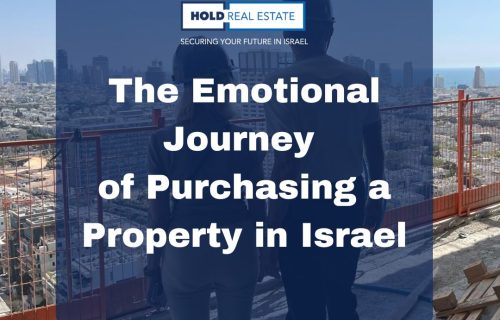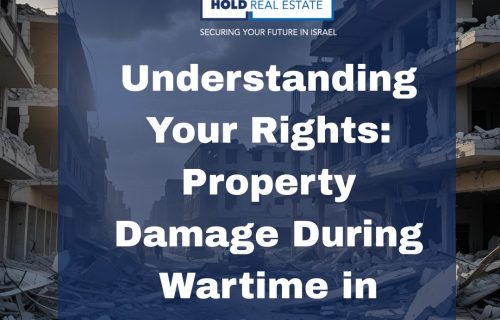Q&A on buying real estate in Israel
Exploring Real Estate Investment in Israel: Common Questions Answered. Are you considering your future in Israel. We've compiled answers to some of the most pressing questions potential buyers often have.
Share Post:
cOMMON QUESTIONS FOREIGN BUYERS ASK!
q&a WITH jULIAN nATHAN – m.D HOLD REAL ESTATE
If you’re planning your future in Israel or want to own something in the Jewish homeland as an investment, we’ve compiled some of the most common questions buyers have.
Q: How have recent events in Israel impacted Israel’s property market?
Undoubtedly, recent events in Israel have stirred uncertainty and volatility in the property market, impacting both buyers and sellers. However, the Israeli real estate market remains stable despite global economic turbulence. The resilience of the Israeli economy, along with a thriving property market, underscores its appeal for long-term capital growth. Israel’s real estate sector continues to display remarkable strength, driven by a significant shortfall of housing units amid overwhelming demand. Challenges such as land allocation for development and labour shortages exacerbate supply shortages. Additionally, rising aliya numbers and foreign investment in Israel further drive property prices upward.
Q: Why should investors consider investing in Israeli real estate now?
There are several compelling reasons to invest now. First and foremost, the demand for property in Israel exceeds the supply. Unfortunately, since October 7th and the slowdown in construction, this trend has not improved. Over the past three months, we have witnessed increased demand for property from foreign buyers. Additionally, major developers are now offering incentives to buyers who can structure excellent payment terms. With the market’s steady growth and stability, now is an opportune time to explore real estate investment in Israel.
Q: What is the minimum down payment for foreign buyers?
For an existing property, a foreigner purchasing property in Israel would need to fund 50% of the purchase price and a mortgage of 50%, subject to bank approval. However, if buying a property that is part of a new development or a pre-construction project, 10-20% will secure the deal with linear payments payable during the development cycle. Once 50% has been paid, the balance of 50% can be funded with a mortgage, which is due on completion. This is how many investors get a foot in the door without having to come up with all the cash at once.
Q: What are the additional costs associated with purchasing property in Israel?
It’s important to remember that there are additional costs, often referred to as “closing costs”, which are due upon purchasing property, whether it’s a new project or an existing property. The purchase tax for foreigners is payable on a property; it’s typically set at 8% of the property value and scales up according to the purchase price. Note that a reduction is available for Israeli citizens living in Israel and new immigrants buying their first homes. Other costs include legal fees (1% to 1.5% + VAT) and realtor/promoter fees (2% to 5% + VAT).
Q: What is a building index?
This cost only applies to buying a property that is still in the development phase. The building index is government-published; it’s an additional amount the government allows developers to charge on any outstanding funds to protect developers and buyers from fluctuations in building costs over the period of development.
Q: What are the advantages of purchasing in a new development?
Purchasing in a new development offers financial “breathing space” as payments can be staggered until the project is developed (3-5 years typically). Historically, this has been very good for capital appreciation. Buyers have more time to arrange the necessary funds, and developers may offer attractive incentives. If you’re considering property investment and don’t require immediate occupancy, opting for a new development provides the flexibility of additional time to gather the required 50% equity needed. Moreover, many buyers appreciate the opportunity to customise layouts and select finishes according to their preferences. However, it’s crucial to ensure you’re dealing with reputable developers whose projects are backed by guarantees from financing banks.
Q: Can buyers purchase property remotely, and what steps are involved?
Absolutely. The purchasing process, including opening bank accounts and completing mortgage applications, can be completed remotely. Legal representation and power of attorney facilitate transactions.
Q: How do you select the projects that you market and sell?
For close to 30 years, our team has been locating attractive real estate opportunities in Israel, focusing on high-demand and urban renewal areas where we believe long-term capital appreciation will occur.
Q: What rental income can a buyer expect from renting out the property?
The average rental yield for apartments in Israel typically ranges from 2,5% to 3,5%. However, this can vary based on location, property type, and market conditions. Some investors may achieve higher yields, especially in high-demand areas or through short-term rentals like Airbnb. It’s essential to conduct thorough research and consult with real estate professionals to determine the expected rental yield for specific properties in Israel.
Q: What costs does the tenant cover?
Tenants typically cover electricity, water, gas, and internet expenses, paying these directly to the relevant service providers. Additionally, they are responsible for the municipality tax (Arnona), building maintenance fees (Vaad Bayit), and minor repairs and maintenance.
Q: How did you get involved in Israeli real estate?
I speak from experience because before making aliya in 2017, I bought my first property from Hold Real Estate. It was a wonderful experience as an investor, and as my relationship with the Hold Real Estate team developed, I recognized the potential in the market, especially for investors abroad. Of course, the investment turned out to be very good.
Q: What is the first step for someone considering a property purchase in Israel?
Firstly, it’s important to clarify how much money you want to invest and for what purpose. Is it purely for investment or holidays, or will you be living on the property? The next step would be to find a partner who can assist you in finding the right opportunity at the right price. Lastly, my advice is not to procrastinate too long, as deals aren’t on the table for long, and demand is growing. If you find a good deal and trust your partner, don’t wait!
To set up a consultation with Hold Real Estate, email info@hold.co.il or visit https://hold.co.il/futureinisrael
*The contents of this article are designed to provide the reader with general information and not to serve as legal or professional advice for a particular transaction. Readers are advised to obtain advice from qualified professionals before entering into any transaction.
- Jul 2, 2025
- Jun 17, 2025
- Apr 24, 2025



